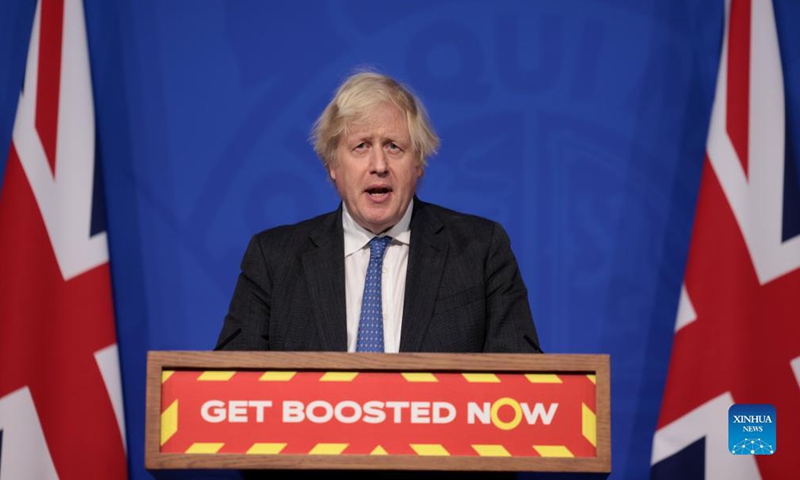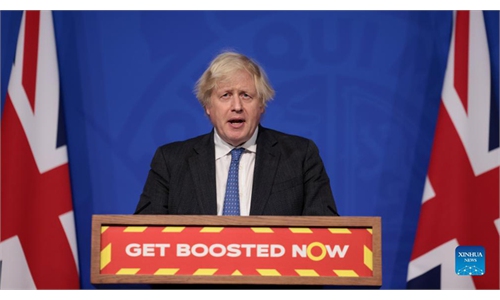
British Prime Minister Boris Johnson speaks at a COVID-19 press conference in the Downing Street media briefing room in London, Britain, Dec. 15, 2021. Britain reported 78,610 new coronavirus cases, the highest daily number since the start of the pandemic, bringing the total number of coronavirus cases in the country to 11,010,286, according to official figures released Wednesday. (Simon Dawson/No. 10 Downing Street/Handout via Xinhua)
In May 2020, Johnson blatantly violated the epidemic prevention measures and invited over 100 people to a "bring your own booze" party at his official residence. And on April 16, 2021 - the eve of the funeral of Britain's Prince Philip - Downing Street staff held two parties at a time when COVID-19 restrictions banned indoor gatherings in the UK. This "partygate" has made Johnson's leadership face its most serious challenge yet. According to a report of The Guardian, Johnson is likely to be "ousted within two weeks," bringing his premiership to a "disastrous end." Although Johnson has drawn up an "operation save big dog" plan, trying to help himself out of the dilemma, the Huffington Post reported that "the dog appeared to be out of the kennel."
Johnson's political career is hanging in the air, which not only reflects the failure of an individual Western politician to abide by rules and regulations, but also shows the systematic powerlessness of Western societies, including the UK. If the essential problem of officials' governance ability is not resolved, Western society may only face a more pessimistic situation when facing similar public crises.
In China, derelict officials in the COVID-19 fight would face consequences. But no one in the UK has stepped up to take responsibility for the failure, although more than 150,000 innocent people have died from COVID-19 in the UK, as if the result means nothing as long as politicians follow the so-called rules and procedures - in Johnson's case, as long as he did not hold parties.
"The UK prime minister may resign, not because of his failed COVID-19 fight, but for holding parties. This seems a little absurd. What is most absurd is the Western political system is focused on form and procedure, leaving no way to discuss essential issues and concrete results," Shen Yi, a professor at the School of International Relations and Public Affairs of Fudan University, told the Global Times.
"This can be called a political decay. The entire political system can only function in a rigid way - in other words, no matter how bad the result is, Western politicians' status cannot be shaken as long as they stick to the so-called procedure and agenda. This will eventually lead to a vicious cycle: Politicians who come to power will all be masters of political stunts, regardless of their governance ability and achievements," Shen said.
And if Johnson really steps down due to "partygate," China-UK relations may be even less optimistic in the future. Although the Johnson administration has followed Washington in its China policy, he still called himself "fervently Sinophile," showing a contradictory attitude toward China. The British parliament and many domestic political forces have created a strong anti-China atmosphere, and Johnson cannot go against such a political trend.
"If Johnson steps down, I am pessimistic about future China-UK relations. There is a possibility a hawkish figure could attain party leadership," Tom Fowdy, a British political and international relations analyst, told the Global Times.
"Liz Truss appears to be one individual aspiring to leadership, and her anti-China views are borderline extreme. They have replaced the Euroskeptic wing of the Conservative Party, and are constantly looking for opportunities to force through their agenda and undermine the government, such as rebelling on Huawei, banning the Chinese ambassador from the Commons or pushing the 'genocide motion,'" Fowdy said.



